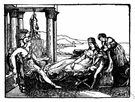dido
(redirected from didos)Also found in: Thesaurus, Idioms, Encyclopedia.
Di·do
(dī′dō)n. Roman Mythology
The founder and queen of Carthage, who fell in love with Aeneas and killed herself when he abandoned her.
di·do
(dī′dō)n. pl. di·dos or di·does
A mischievous prank or antic; a caper.
[Origin unknown.]
American Heritage® Dictionary of the English Language, Fifth Edition. Copyright © 2016 by Houghton Mifflin Harcourt Publishing Company. Published by Houghton Mifflin Harcourt Publishing Company. All rights reserved.
dido
(ˈdaɪdəʊ)n (usually plural) , pl -dos or -does
an antic; prank; trick
[C19: originally US: of uncertain origin]
Dido
(ˈdaɪdəʊ)n
(Classical Myth & Legend) classical myth a princess of Tyre who founded Carthage and became its queen. Virgil tells of her suicide when abandoned by her lover Aeneas
Collins English Dictionary – Complete and Unabridged, 12th Edition 2014 © HarperCollins Publishers 1991, 1994, 1998, 2000, 2003, 2006, 2007, 2009, 2011, 2014
di•do
(ˈdaɪ doʊ)n., pl. -dos, -does. Usu., didos, didoes.
1. a mischievous trick; prank; antic.
2. a bauble or trifle.
[1800–10; orig. uncertain]
Di•do
(ˈdaɪ doʊ)n.
a legendary queen of Carthage who killed herself when abandoned by Aeneas.
Random House Kernerman Webster's College Dictionary, © 2010 K Dictionaries Ltd. Copyright 2005, 1997, 1991 by Random House, Inc. All rights reserved.
ThesaurusAntonymsRelated WordsSynonymsLegend:
Switch to new thesaurus
| Noun | 1. |  Dido - (Roman mythology) a princess of Tyre who was the founder and queen of Carthage; Virgil tells of her suicide when she was abandoned by Aeneas Dido - (Roman mythology) a princess of Tyre who was the founder and queen of Carthage; Virgil tells of her suicide when she was abandoned by AeneasRoman mythology - the mythology of the ancient Romans |
Based on WordNet 3.0, Farlex clipart collection. © 2003-2012 Princeton University, Farlex Inc.
Translations
Collins Spanish Dictionary - Complete and Unabridged 8th Edition 2005 © William Collins Sons & Co. Ltd. 1971, 1988 © HarperCollins Publishers 1992, 1993, 1996, 1997, 2000, 2003, 2005
Collins Italian Dictionary 1st Edition © HarperCollins Publishers 1995